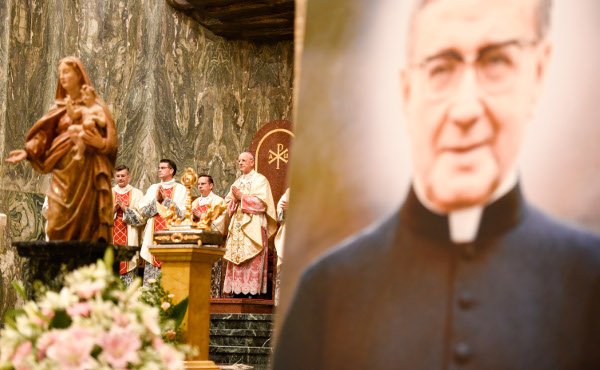Homily on the Feast Day of St Josemaría by
Monsignor Fernando Ocáriz, Prelate of Opus Dei
Basilica of St Eugene, Rome, 26 June 2017
As we recall today the message of the universal call to holiness and apostolate, of which St Josemaría was a herald during his earthly life, our heart is filled with joy and gratitude to our Lord.
The Collect prayer from the liturgy highlights this truth proclaimed by the Second Vatican Council and, referring to St. Josemaría, adds: “Grant that by his intercession and example we may, through our daily work, be formed in the likeness of Jesus your Son.” This petition sums up our path on earth: to become more like Jesus each day, through an activity as familiar to us as work.
The light of faith widens the horizons of our work: it makes us see that man was created by God, and placed “in the garden of Eden to till it and keep it” (Gen 2:15). The earth is entrusted to mankind as a garden to be cultivated and nurtured every day, a space with enormous possibilities, which we must discover and develop for the glory of God and the service of our brothers and sisters.
The Holy Spirit is the great protagonist on this path of holiness in daily life. As St. Paul says to the Romans: “You have received the spirit of adoption of sons, whereby we cry: ‘Abba, Father!’” (Rom 8:15). It is a cry, a prayer, that the Holy Spirit places on our lips, and that we can repeat throughout the day, for example when we experience tiredness in our professional activities, and we have to continue working. Knowing ourselves to be God’s children encourages us to pray and to serve all men and women, and not remain indifferent to those who suffer from various situations such as unemployment or an insecure job.
The light of the Holy Spirit leads us to Jesus, who comes to meet us, as he sought out the first disciples by the Lake of Gennesaret. He enters our lives in the same way that he got into the boat of Peter and his companions. And the same boat that had witnessed a professional failure –a night spent fish when nothing had been caught—becomes the Master’s teaching chair, the place from which he reveals the mysteries of the Kingdom of God. And in that same boat a supernatural adventure begins, prefigured by the miraculous catch of fish. Christ’s presence transforms our work, our old boat, into the place where God acts. And this can be done with gestures that are simple but filled with charity: helping a colleague we find it hard to like, but who needs practical advice to finish well what he is doing; or perhaps dedicating a few minutes to someone, if we know they need to talk because their face reflects some worry.
Our Lord asks us to be instruments in his hands, to bring joy and happiness to this world that is so in need of it. He addresses to us the same invitation he made to Peter: “Put out into the deep and let down your nets for a catch” (Lk 5:4). The nets, this time, are cast into that work imbued with divine grace, so that it becomes a place of Christian witness, of sincere help to our colleagues and all the people we deal with. We can recall here Pope Francis’ invitation: “When your efforts to reawaken faith in your friends seem to be in vain, like the nocturnal efforts of the fishermen, remember that with Jesus everything changes. The Word of the Lord has filled the nets and the Word of the Lord makes the missionary work of his disciples effective” (Address, 22 September 2013).
The Holy Spirit, who dwells in us, will spur us, if we allow it, to put out into the deep, that is, to enter those apostolic horizons that we discover every day: in our family, in our professional environment, in our relationships with friends and acquaintances. The miracles will be repeated, as Saint Josemaría said: “When Jesus went out to sea with his disciples he was not thinking only about the catch of fishes. And so when Peter falls down at his feet and humbly confesses: ‘Depart from me, Lord, for I am a sinful man,’ our Lord replies: ‘Do not be afraid; henceforth you shall be a fisher of men’ (Lk 5:10). In this new task of fishing, all the power and effectiveness of God will also be at hand: the apostles are instruments for the working of great wonders, in spite of their personal shortcomings” (Friends of God, no. 261). For we too must be apostles, apostles in the midst of our work and all the human realities that we try to bring to God.
Our Lady is the Queen of Apostles, as we invoke her in the litanies of the Rosary. Let us ask Mary to teach us to actively assist the Church’s mission for the salvation of the world. This was the longing that St. Josemaría treasured in his heart: to place Christ at the center and root of every human activity, in union with the whole Church: omnes cum Petro ad Iesum per Mariam!
